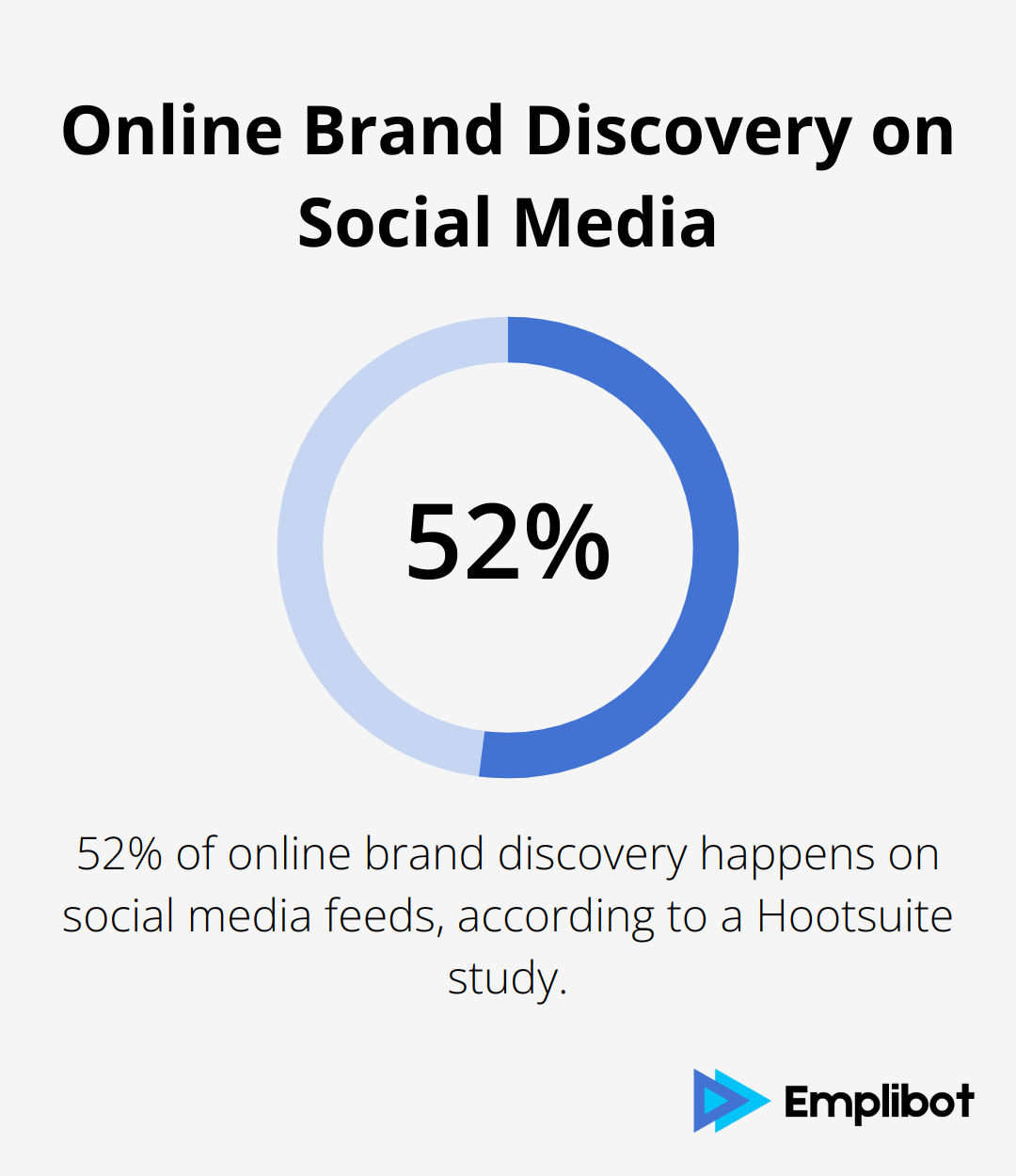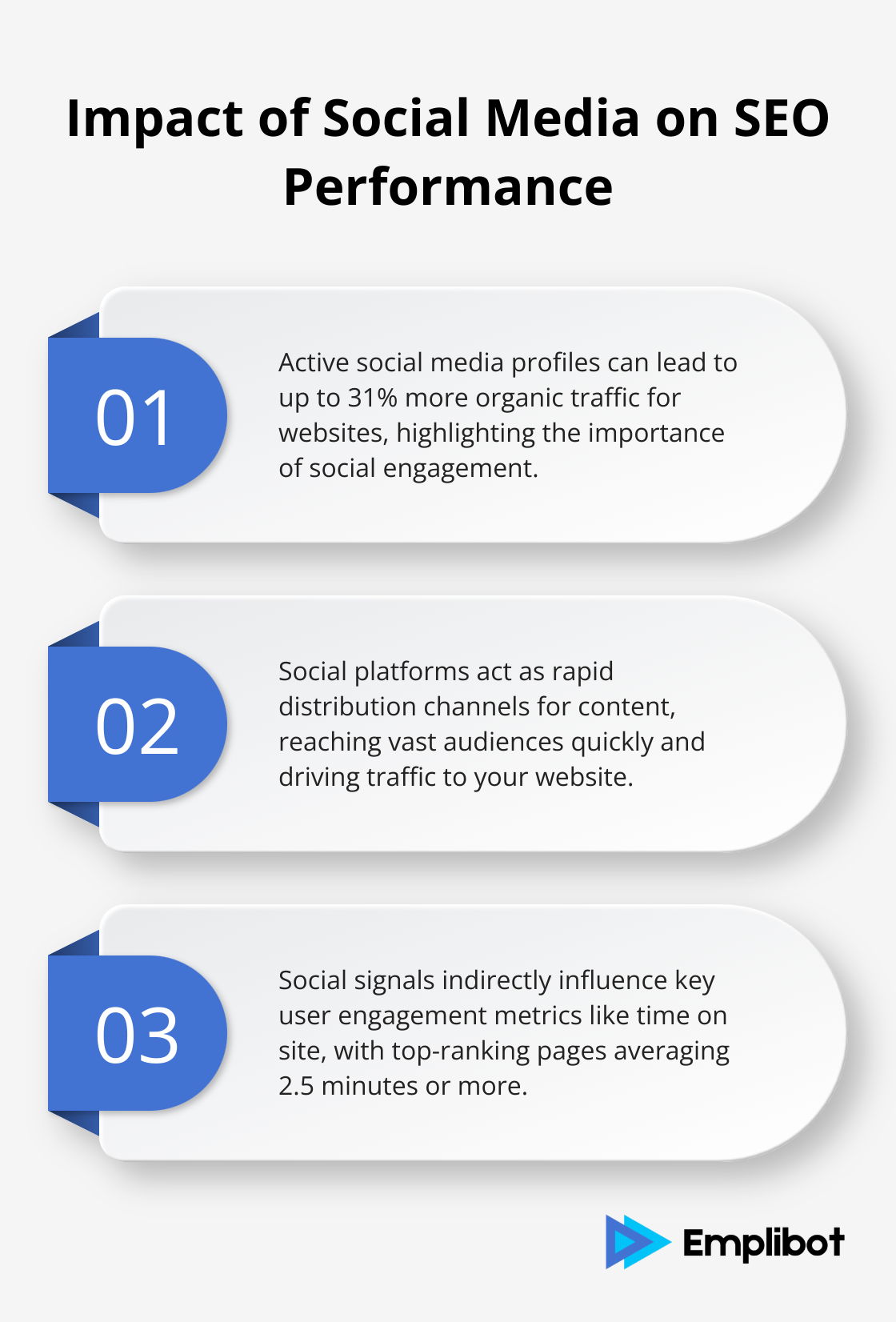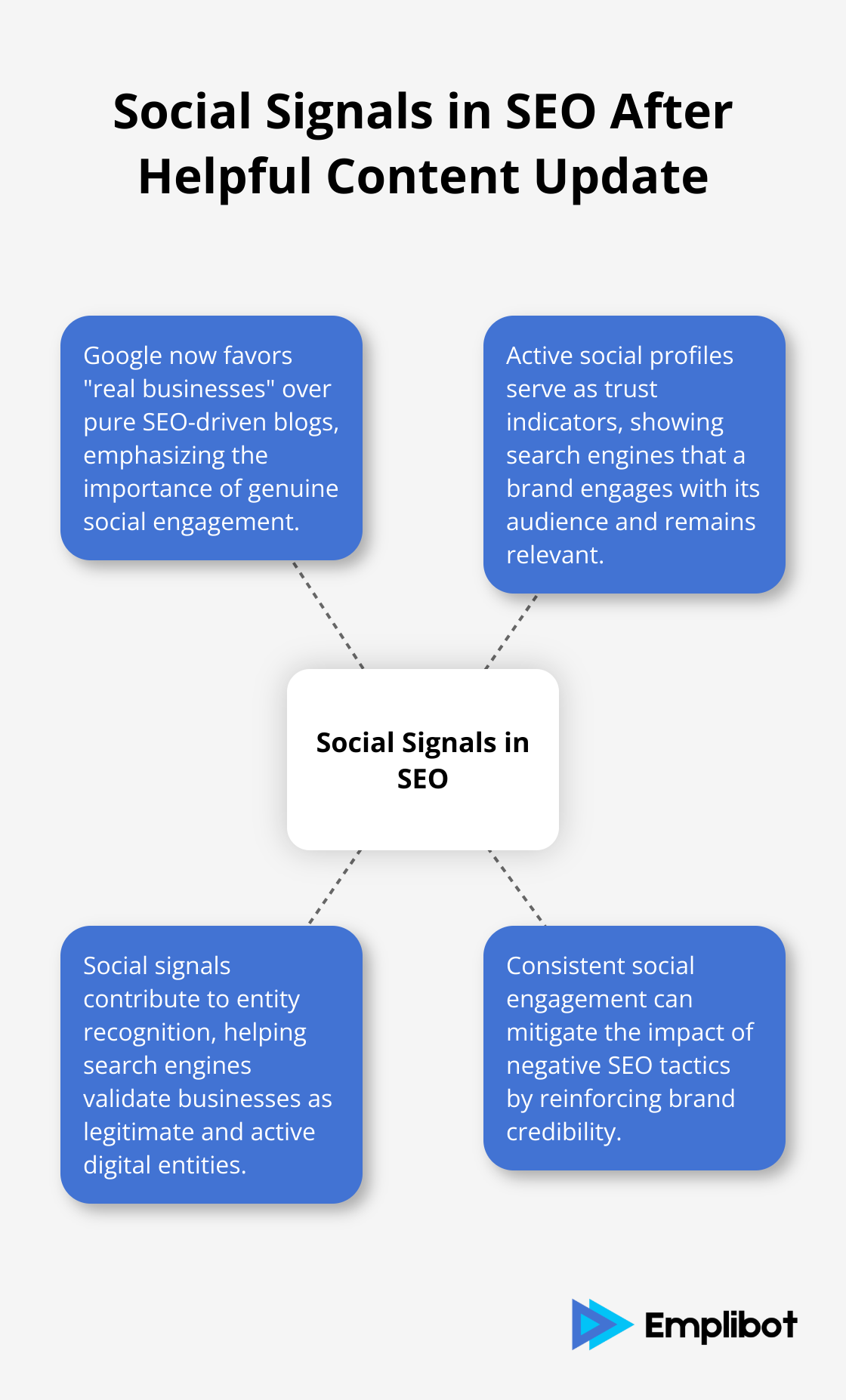Google’s recent push for Reddit, Quora, and other social networks has shaken up the SEO landscape. At Emplibot, we’ve noticed a significant shift in how search engines value social signals.
This change reflects Google’s preference for ranking “real businesses” over pure blogs that exist solely for search traffic. In this post, we’ll explore how social signals in SEO can impact your website’s visibility and why they’re more important than ever.
Contents
ToggleWhy Social Signals Matter in Modern SEO
The Social Media Revolution in Search
Google’s recent algorithm updates have sparked discussions about content from social platforms like Reddit and Quora. Numerous webmasters and bloggers are reporting significant drops in traffic following the “Helpful” Update. This shift sends a clear message: social engagement influences search results. Posts and discussions from these platforms now often outrank traditional websites.
Real Businesses vs. SEO-Only Websites
Google now favors websites of “real businesses” over those that exist solely for search traffic. This preference stems from the belief that established businesses offer more value to users. They typically have a physical presence, customer service, and a range of products or services – all indicators of legitimacy and user trust.
Direct Traffic: A Key Ranking Factor
Direct traffic has emerged as a crucial factor in search rankings. Recent studies suggest that robust website traffic can enhance your search rankings. This correlation suggests that Google views direct traffic as a sign of brand strength and user preference.
Social Profiles as Trust Indicators
Active social media profiles have become essential for businesses aiming to improve their SEO. They serve as trust signals, showing search engines that a brand engages with its audience and remains relevant in its industry. For example, a company with a strong social media presence and regular engagement will likely receive more favorable treatment than one without a social presence.
The Blurring Lines Between Social and Search
Social signals have transformed from a “nice-to-have” to a “must-have” in SEO. As search engines evolve, the boundaries between social media and search continue to blur. This shift creates new opportunities (and challenges) for businesses striving to enhance their online visibility.
The impact of social signals on SEO continues to grow. In the next section, we’ll explore specific ways these signals influence search rankings and how businesses can leverage them effectively.
How Social Signals Boost SEO Performance
Amplifying Brand Awareness
Social media platforms act as powerful megaphones for your brand. User engagement with your content through likes, shares, and comments expands your reach exponentially. A Hootsuite study found that 52% of online brand discovery occurs on social media feeds. This increased visibility often leads to higher brand recognition, which can result in more branded searches. Google interprets these branded searches as a sign of relevance and authority, potentially improving your rankings for related keywords.

Accelerating Content Distribution
Social platforms function as rapid distribution channels for your content. When you share a blog post or article on social media, it reaches a vast audience quickly, driving traffic to your website. This influx of visitors sends positive signals to search engines about the relevance and value of your content. Social signals boosting SEO performance can lead to increased organic traffic, with websites having active social media profiles experiencing up to 31% more organic traffic compared to those without.

Enhancing User Engagement Metrics
Social signals indirectly influence key user engagement metrics that search engines consider when ranking websites. Users who discover your content through social media and find it valuable are more likely to spend more time on your site, visit multiple pages, and return for future visits. These behaviors positively impact metrics like time on site, pages per session, and bounce rate. A Searchmetrics study revealed that pages ranking in the top 3 positions on Google have an average time on site of 2.5 minutes or more, highlighting engagement’s importance in SEO success.
Building Quality Backlinks
Social media engagement often leads to natural backlink generation. When your content resonates with users, they’re more likely to share it on their own websites or blogs. These organic backlinks (which search engines view as “votes of confidence”) can significantly boost your domain authority and search rankings. While social shares themselves aren’t direct ranking factors, they often result in valuable backlinks that are.
Improving Local SEO
For businesses with a physical presence, social signals play a vital role in local SEO. Positive reviews, check-ins, and mentions on social platforms (especially location-based ones like Google Business Profile) can improve your visibility in local search results. This local engagement signals to search engines that your business is active and valued in its community.
As we explore the impact of social signals on SEO, it’s clear that they extend beyond mere engagement metrics. In the next section, we’ll examine how these signals contribute to entity recognition and why this matters for businesses aiming to establish a strong online presence.
How Social Signals Boost Entity Recognition
Google’s recent push of Reddit and Quora in search results highlights the importance of social signals in SEO. This shift, particularly evident since the Helpful Content Update in September 2023, emphasizes Google’s preference for ranking “real businesses” over pure blogs that exist solely for search engine traffic.

The Power of Active Social Profiles
Active social media profiles are essential for businesses that want to improve their SEO. Direct traffic boots rankings, according to new research. This traffic boost partly results from improved entity recognition by search engines.
When your business engages consistently on social platforms, it creates a digital footprint that search engines can easily track and verify. This activity establishes your brand as a real, active entity (rather than just another website). Regular posts, customer interactions, and shared content all contribute to building a robust online presence that search engines recognize and value.
Navigational Queries and Brand Authority
Social signals significantly impact entity recognition in the case of navigational queries (searches where users look for a specific brand or website). For businesses with exact match domains (EMDs), social signals become even more important.
Consider a company named “Best Plumbers Inc.” with the domain bestplumbers.com. Without strong social signals, Google might interpret searches for “best plumbers” as informational queries rather than navigational ones for this specific company. However, with active social profiles and engagement, Google will more likely recognize the brand as an entity and display its website prominently in search results for that query.
Legitimacy Through Social Proof
Social signals serve as a form of social proof, which helps convince search engines of a business’s legitimacy. This trust extends to the digital realm, where likes, shares, and comments act as digital word-of-mouth.
When your content receives high engagement on social platforms, it signals to search engines that users find value in what you offer. This engagement can lead to improved rankings, as search engines interpret this social proof as an indicator of content quality and relevance.
Mitigating Negative SEO
Social signals can help mitigate the impact of negative SEO tactics. If your business has a strong social presence with consistent engagement, it becomes harder for competitors to damage your online reputation through black hat SEO techniques.
A robust social media presence (with regular interactions and positive sentiment) acts as a buffer against potential reputation attacks. Search engines take these social signals into account when evaluating the overall credibility and authority of your brand.
Final Thoughts
Social signals in SEO have become a powerful force in modern digital marketing strategies. These signals boost brand visibility, accelerate content distribution, and enhance user engagement metrics. They also play a vital role in entity recognition, helping search engines validate businesses as legitimate and active entities in the digital space.
Companies should focus on creating high-quality, shareable content that resonates with their audience to leverage social signals effectively. Consistent engagement across various social platforms, prompt responses to user comments, and encouragement of user-generated content all contribute to stronger social signals. Integration of social media strategies with overall SEO efforts ensures a cohesive and aligned online presence.
Emplibot understands the challenges of maintaining an active social media presence while producing regular, SEO-optimized content. Our platform automates the process of repurposing your blog content for social media, handling everything from keyword research to content creation and distribution across platforms (like LinkedIn, Facebook, and Twitter). This automation allows businesses to boost their social signals and improve their SEO performance while saving time and resources.










